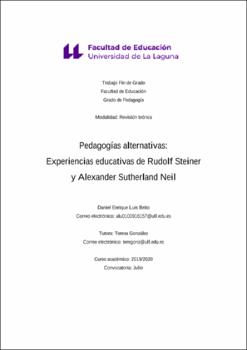Pedagogías alternativas: experiencias educativas de Rudolf Steiner y Alexander Sutherland Neil.
Author
Luis Brito, Daniel EnriqueDate
2020Abstract
El presente trabajo de Fin de Grado (TFG) se centra en mostrar las ideas de dos
educadores del S. XIX como fueron Alexander Sutherland Neill y Rudolf Steiner. Ambos
se vieron enormemente motivados en sus ideas por las carencias que poseía la educación
que llegaron a recibir, enseñanzas obligadas, ausentes de libertad plantearon dudas en
ellos respecto a si realmente eran necesarias para educar por lo que trataron de buscar
alternativas hasta que lograron sentar las bases de dos pedagogías conocidas hasta la
fecha, Neill creó su escuela y modelo pedagógico Summerhill en el que buscaba el
desarrollo personal y emocional del niño/-a y Steiner creó las bases de la pedagogía
Waldorf, llevada a la práctica a día de hoy en cientos de colegios alrededor de todo el
mundo en los que se dan conocimientos tanto a los docentes como al alumnado en busca
de una educación ajustada a las necesidades reales que demanda el niño/-a.
Siendo cuestionados por sus métodos, estos dos hombres dieron al mundo la
posibilidad de contemplar que existen maneras válidas para educar y que respetan
elementos descuidados por las sociedades.
El siguiente trabajo parte de una breve explicación de las bases de estas dos
pedagogía y narra cómo son llevadas a cabo en la vida real. The following End of Grade (TFG) work focuses on showing the ideas of two
19th-century educators such as Alexander Sutherland Neill and Rudolf Steiner. Both were
hugely motivated in their ideas by the shortcomings that they received, obligatory
teachings, absent from freedom raised doubts in them as to whether they were really
necessary to educate so they tried to look for alternatives until they managed to lay the
foundations for two known pedagogies to date, Neill created his Summerhill school and
pedagogical model in which he sought the personal and emotional development of the
child and Steiner created the foundations of Waldorf pedagogy, implemented today in
hundreds of schools around the world where teachers and students are given knowledge
in search of an education tailored to the real needs demanded by the child.
Being questioned by their methods, these two men gave the world the opportunity
to contemplate that there are valid ways to educate and that they respect elements
neglected by societies.
The next work starts from a brief explanation of the basics of these two pedagogy
and narrates how they are carried out in real life.





